Backyard Chickens and the People Who Love Them
Air Date: Week of May 19, 2023
“Under the Henfluence: Inside the World of Backyard Chickens and the People Who Love Them” is Tove Danovich’s debut nonfiction book. (Photo: Courtesy of Agate Publishing)
As many as 13 percent of American households now keep chickens as pets and a cruelty-free source of fresh eggs. Tove Danovich, author of the new book Under the Henfluence: Inside the World of Backyard Chickens and the People Who Love Them, joins Living on Earth’s Bobby Bascomb to share the joys of raising chickens.
Transcript
DOERING: Less than two percent of US residents live on farms these days, but the American Pet producers Association tells us as many as thirteen percent of American households now keep chickens. Spring is the usual time to start or supplement flocks, and the US Postal service still ships day-old chicks to folks who want to raise them in their backyards. Tove Danovich is the author of the new book Under the Henfluence: Inside the World of Backyard Chickens and the People Who Love Them. She spoke with Living on Earth’s Bobby Bascomb.
BASCOMB: So you literally wrote the book on backyard chickens. What do you see as the benefits of raising your own chickens?
DANOVICH: I mean, the most obvious benefit is, of course, that you have eggs that are as local as they can possibly be. You know exactly how the hens were raised, you know the feed that goes into them. And most importantly, you know that those girls had happy and probably much longer lives. In the industrial poultry system, for egg laying breeds, they tend to be killed after they're about a year and a half or two years old, because they're going through their first molt. And because they're using up so much energy, they stop laying eggs. So those ladies are just all killed when they are that old, and a hen left to her own devices can easily live eight to ten years, if not more. And in addition to having them lay you breakfast, which is certainly a perk, if you're interested in gardening or farming in your backyard, chicken manure can make for the most amazing compost. But they're just very sweet and personable. So at this point, my flock has really become more of pets than livestock.
BASCOMB: The subtitle of your book here is, "Inside the World of Backyard Chickens, and the People Who Love Them." Have you observed, you know, the relationships that people end up having with these chickens?
DANOVICH: Definitely. So I think there's something just really wonderful where, because chickens have been with us as humans for so long, people just have these really strong connections to them, no matter how old you are. In one chapter of the book, I got to spend a year with a 4-H group based in Seattle. And it was mostly kids that were like 8 to 17 or so. And they were learning all about chickens. And then on the other hand, I also covered some therapy programs, where in certain elder care facilities, especially places for people with memory issues, a lot of places have realized that you can have chickens, and that residents get really involved in these birds and the care of them or just watching them. Sometimes, you know, an animal can be therapeutic where you're just spending time with them, which is something I have definitely found in my own flock. When I'm having a bad day, just getting into the yard and taking a nice chair in the sun and watching the ladies do their thing, I just feel so much better. And so I think they can just be great for that engagement in a way that just lets our busy minds kind of calm down.
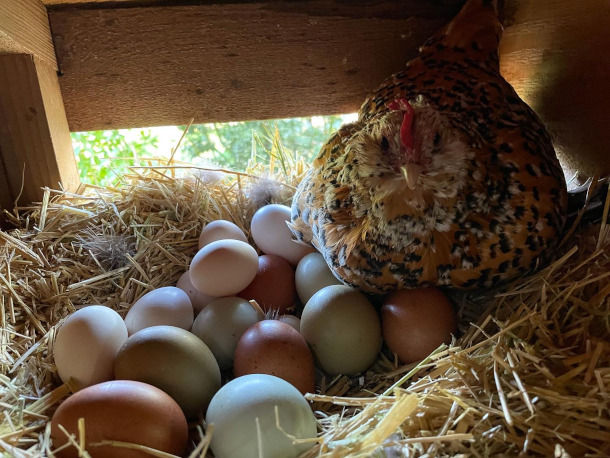
While egg-laying hens in the industrial poultry system are killed at around 1 year of age, backyard chickens can live up to ten years. Author Tove Danovich’s hen, Emmylou, sits proudly atop her stash of eggs. (Photo: Tove Danovich)
BASCOMB: So you know, we have this expression, "bird brained" and you know, chickens are maybe thought of as not the most intelligent animals in the world. But what have you observed of them as somebody who you know, takes the time to really look?
DANOVICH: You know, one thing about chickens is they are birds, we are mammals. And there's a little bit of a disconnect, where it takes more time to kind of understand and appreciate the bird mind than to connect with our dogs or cats or even you know, cows and pigs, the other very common farm animals. But if you spend enough time with chickens, you really learn that they're amazingly complex animals. First of all, they're flock animals. The expression, "the pecking order," that comes from chickens, and refers to how they figure out, you know, the hierarchy of the flock and their social relationships with each other. And they have friendships. Sometimes one won't get along with another. If one of them dies, and they're particularly close, like, they grieve. You know, one chicken dying, and another one that doesn't leave the nest for a number of days, and is fluffed up and stops eating and like all the same symptoms that go along with grief as we understand it. And they are just really remarkable, lovely little creatures that I think we just need to take a little bit more time to get to know them and appreciate them.
BASCOMB: So they're good for our mental health and also physical health. I mean, the eggs that you get from your backyard chicken just really can't compare to what you're getting from the grocery store, I think.
DANOVICH: Yeah, they're lovely. But I definitely think there are health benefits that go beyond just the nutritional value. You know, not being part of a system that is bad for the environment and bad for people working in it and bad for the animals. There is a health benefit to that for all of us.
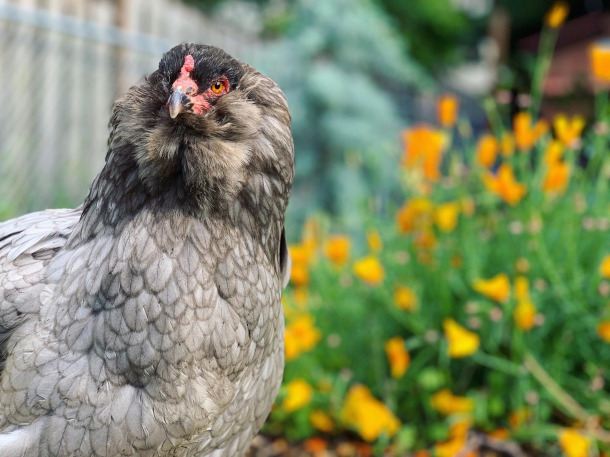
The phrase, “the pecking order” comes from chicken’s social organization. Tove Danovich’s “head hen” is named Peggy. (Photo: Tove Danovich)
BASCOMB: So to what degree do you see, you know, a moral imperative to not be part of that commercial system?
DANOVICH: I do think it's important to know about the conditions of how your food is raised and how your choices might be affecting that. Certainly not everyone is in a place to be able to raise their own chickens, but I think we can all do things to raise the welfare of chickens in our farms to go from battery cages, which is still how the majority of laying hens are kept. And they're caged from when they're hatched basically until they're sent off when they're considered too old to lay anymore. And one interesting thing about chickens is that their ability to lay eggs, we have really maximized over time. And when you have, you know, a farmer on an industrial egg farm, they're choosing so called production breeds that lay as many eggs as they possibly can as quickly as they can. And as a result, they're very prone to reproductive issues with, you know, eggs breaking and things like that inside of them, and also ovarian cancer. And we could very easily be doing better than that for our hens. And that doesn't have to mean raising chickens in the backyard.
BASCOMB: And of course, these factory farms are also very harmful to the local environment and the people who work there. Can you talk a bit about that?
DANOVICH: Like many industrial farms, there is a huge problem with waste. You have hundreds of thousands of these birds kept in one barn. I mentioned before that chicken manure, it can be turned into this amazing compost and fertilizer. And that is true, but you have to process it with other things. So what used to happen is farmers would be able to spread this chicken manure on their farmland and the land could take it up. But now we have so much of it that there is simply too much of a nutrient load. And much of the Chesapeake Bay is having a lot of really bad problems with algae and nutrient runoff. And a lot of that is the result of chicken farms. And the way people are treated who work in these farms is not a whole lot better than the animals themselves. You have these animals that are being raised and sold as cheaply as possible, and the people providing the labor for that are having to do as much as possible with as little money as possible too.
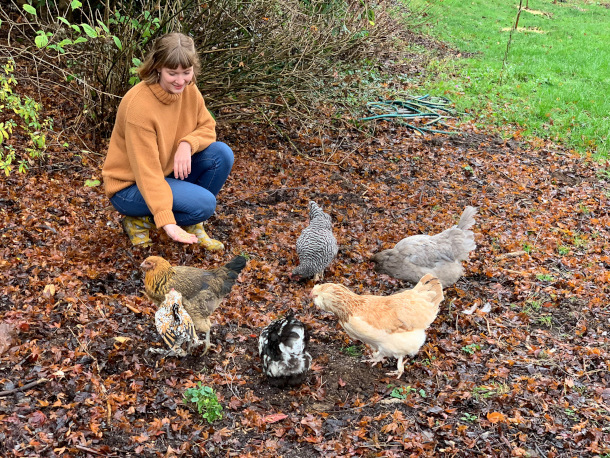
Tove says tending to her flock of “ladies” can be therapeutic. (Photo: Tove Danovich)
BASCOMB: So I think we've made the case now for raising backyard chickens. But if you live in an apartment building or something, it's easy to see, you know how maybe chickens aren't going to be appropriate. But have you ever heard of like, you know how there's urban gardens and people can share garden space, even in a city? Is there any push that you know of to do something like that with chickens?
DANOVICH: I have definitely seen some community gardens that have a small flock of chickens. And I know some schools now have flocks of chickens too. So it's definitely doable, just depending on the rules of whatever your community garden or community space is like. And I think that can be a really great way for people who otherwise wouldn't have the chance or the space to have chickens to get to experience what that's like.
BASCOMB: What about people living in suburban areas that may have local laws that limit keeping chickens? What are some of the common rules that people would have to think about?
DANOVICH: Well, I live in one of those areas. So one of the most common that will come up is that while hens are allowed, roosters are not. So most hatcheries have like a 90% accuracy guarantee. But of course, if you accidentally have a rooster, they're not going to take it back and find it a good home. So that is something to think about. Otherwise common laws tend to just have to do with how far a coop has to be placed from other residences. Sometimes you need permission from your neighbors. And often they cap the number of chickens that you are able to have in your yard. All of those things are very easy to deal with, I think, but the rooster problem is definitely a real problem.
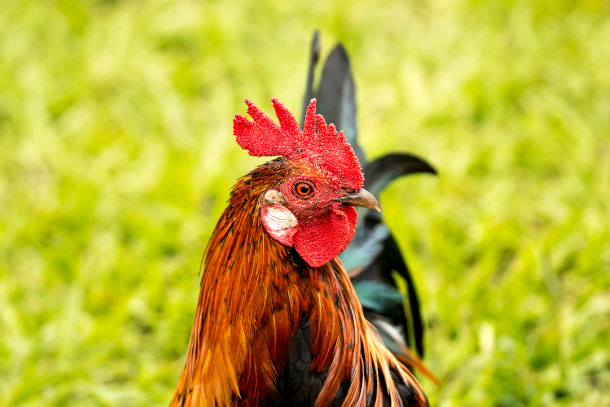
In many suburban areas, chicken keepers are not allowed to have noisy roosters, so some local Facebook groups will adopt “accidental” roosters, or chicks that were sexed incorrectly at birth. (Photo: Jim Bahn, Flickr, CC BY 2.0)
BASCOMB: And is that just because nobody wants to be woken up in the morning? What's the prejudice against roosters?
DANOVICH: Noise is most of it, which is fair, they are quite loud. But as backyard chicken keeping has gotten more popular, especially in these urban and suburban areas, it has created a real issue, where people get all these chicks, and then they fall in love with them. And they're part of the family, and you've named them, and now, oh no, your hen is a boy. And you are not allowed to keep them. And in the past, people would have just, that rooster becomes dinner. Your problem is solved. But people don't want to do that anymore. So there are certain like farm sanctuary organizations or humane societies that in the past might have been able to take in a rooster or two. And now they're just way more roosters wanting homes than people that are able to give these boys a good home.
BASCOMB: Yeah, I've seen some online chicken groups that will take roosters that people don't want or older hens and they'll come collect them and turn them into food for their family. Which, you know, again is a really difficult thing to say, you know, this is your pet that's had a name, but at the same time it's you know, feeding people, and a more local and sustainable way of getting food.
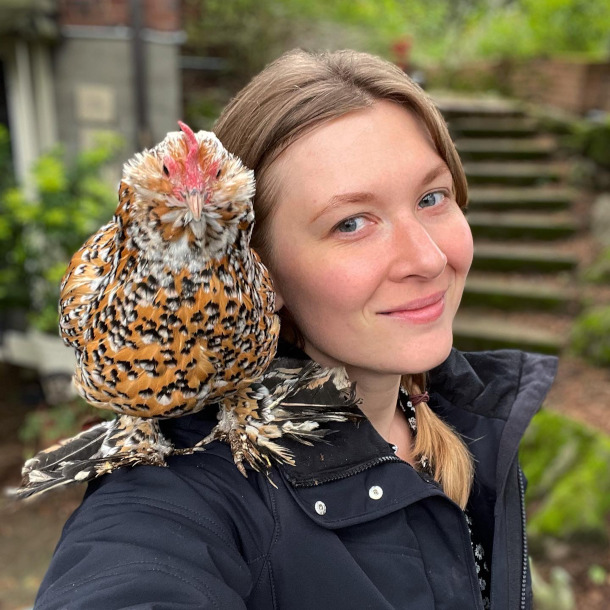
Tove says that all her hens have distinct personalities. Pictured here: Emmylou. (Photo: Tove Danovich)
DANOVICH: That is very true. Yeah, there's this problem of you know, chicken abandonment. And if the choice is, you know, leave your bird to fend for themselves and get killed by some kind of predator or freeze to death in the winter, and going to feed a family, the second option is just better all around. But you can also keep them or try to rehome them yourselves if you have a lot of local Facebook groups. And when I had a rooster that I couldn't keep, that was how he found a home. He was the rooster to a bunch of ladies and had chicks of his own. And that was great. So there are options out there, depending on what you think is the right thing to do.
DOERING: That’s Tove Danovich, author of the new book Under the Henfluence: Inside the World of Backyard Chickens and the People Who Love Them, speaking with Living on Earth’s Bobby Bascomb.
Links
Living on Earth wants to hear from you!
Living on Earth
62 Calef Highway, Suite 212
Lee, NH 03861
Telephone: 617-287-4121
E-mail: comments@loe.org
Newsletter [Click here]
Donate to Living on Earth!
Living on Earth is an independent media program and relies entirely on contributions from listeners and institutions supporting public service. Please donate now to preserve an independent environmental voice.
NewsletterLiving on Earth offers a weekly delivery of the show's rundown to your mailbox. Sign up for our newsletter today!
 Sailors For The Sea: Be the change you want to sea.
Sailors For The Sea: Be the change you want to sea.
 The Grantham Foundation for the Protection of the Environment: Committed to protecting and improving the health of the global environment.
The Grantham Foundation for the Protection of the Environment: Committed to protecting and improving the health of the global environment.
 Contribute to Living on Earth and receive, as our gift to you, an archival print of one of Mark Seth Lender's extraordinary wildlife photographs. Follow the link to see Mark's current collection of photographs.
Contribute to Living on Earth and receive, as our gift to you, an archival print of one of Mark Seth Lender's extraordinary wildlife photographs. Follow the link to see Mark's current collection of photographs.
 Buy a signed copy of Mark Seth Lender's book Smeagull the Seagull & support Living on Earth
Buy a signed copy of Mark Seth Lender's book Smeagull the Seagull & support Living on Earth

